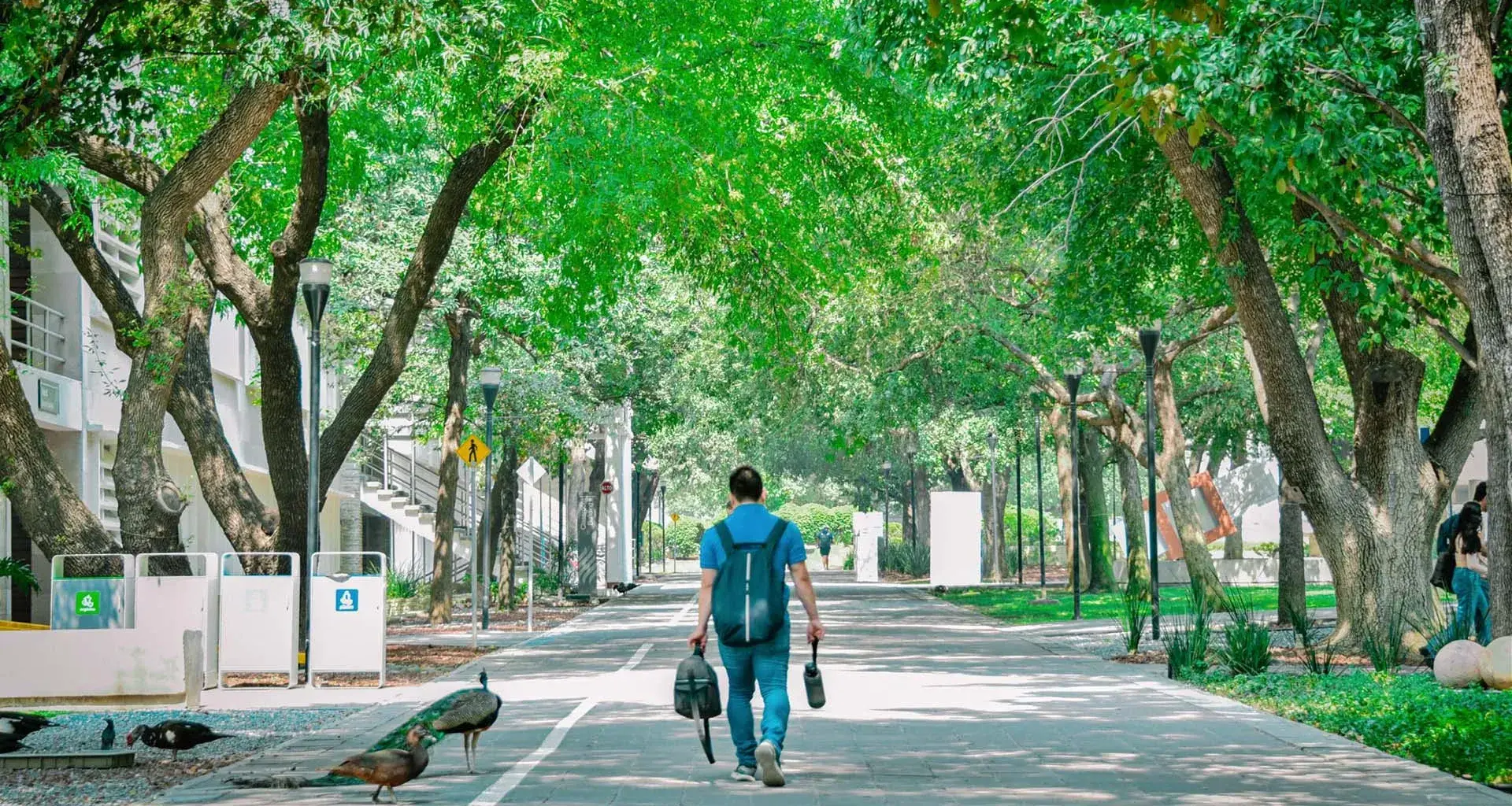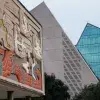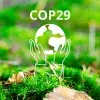sustainability initiatives, the institution has been ranked among the Top 15% of the best-rated universities in the worldin the QS Sustainability 2025 rankings.
The Tec is ranked #2 in Mexico, #69 in Latin America, and #265 worldwide.
According to Feniosky Peña Mora, Executive Vice-President of Research and Dean of the School of Engineering & Sciences at Tec de Monterrey:
“The progress made in the QS Sustainability Rankings is the result of the ongoing effort to innovate and provide solutions that foster the sustainable development of our society. Our commitment to research drives us to seek these solutions.”
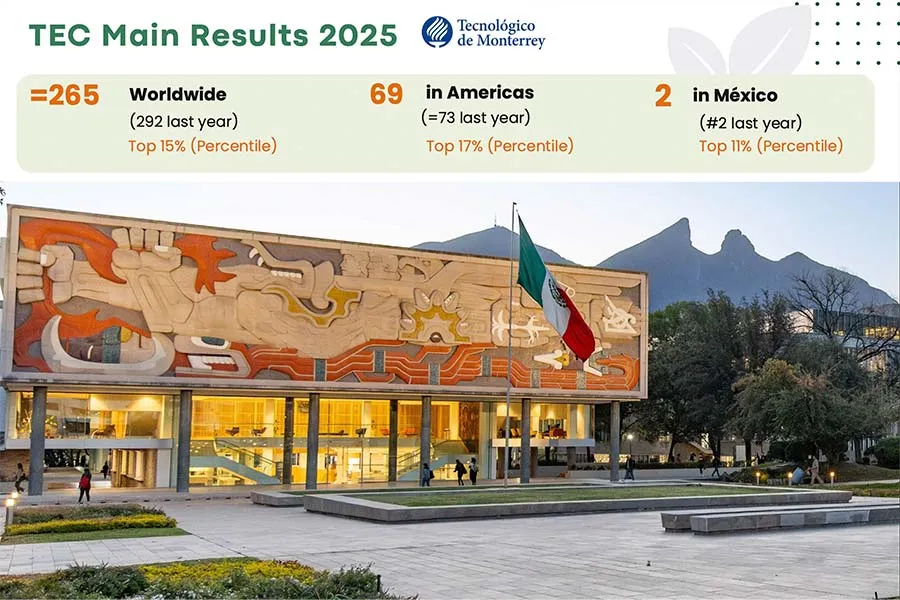
Tec making progress towards sustainability
According to the results of the third edition of the QS Sustainability rankings, the Tec has established itself as one of the leading universities in sustainability at a global level, climbing 27 places from last year and positioning itself among the top 15% of the best universities in the world.
In Mexico, the Tec remains the second-highest-rated university for sustainability, and in Latin America it holds 69th place in the rankings, moving up four places from last year.
The international rankings evaluate the performance of institutions in three main areas: Social Impact, Environmental Impact, and Governance. This year, the Tec has made significant improvements in two of these:
- Social Impact: It was ranked 237th globally, with a score of 82.8 points and climbing 10 places from last year.
- Environmental Impact: It climbed 86 places in the rankings, holding 301st place with a score of 65.9 points.
- Governance: the Tec maintained a stable rating (70 points).
"The progress made in the QS Sustainability Rankings is the result of the ongoing effort to innovate and provide solutions that foster the sustainable development of our society.” - Feniosky Peña
International evaluation firm QS specifies that the Tec’s Ruta Azul initiative is one of the key strategies behind this progress due to its initiatives focused on reducing emissions, promoting renewable energy, and education for sustainable development.
According to Paola Visconti Arizpe, Director of Sustainable Development at Tecnológico de Monterrey, this recognition:
“Is an achievement that reflects the combined effort of every operational and academic area of the Tec to establish itself as a model for sustainability. More than just recognition, we’re aiming to promote a cultural change in which we all make informed decisions for a sustainable future.”

15 of the Tec community’s sustainable actions
The Tec community’s actions for sustainability are reflected in its Sustainability and Climate Change Plan for 2025(Ruta Azul), which includes more than 70 projects.
Some of the most important Ruta Azul actions from 2023-2024 include:
1. 28 working teams were established as strategic partners to implement national initiatives and align efforts on sustainability.
2. 10 campuses were assessed through the STARS (Sustainable Travel Accreditation and Recognition for Schools) methodology, with the following results:
- Monterrey campus won gold.
- Guadalajara, Querétaro, State of Mexico, Mexico City, Santa Fe, Toluca, Puebla, Chiapas, and North Sonora won silver.
3. To prevent and reduce the use of plastic bottles on campuses, 411 new drinking fountains were installed, giving a total of 954 nationwide. This system allowed the elimination of bottle sales in internal cafeterias and branches of ChilaquilesTec.
4. The TecFood2Go circular system of reusable containers was launched and is available on the Monterrey, Querétaro, and Guadalajara campuses. This avoids and reduces the use of disposable packaging.
5. The Culture of Sustainability program was launched, aimed at the institution’s faculty and staff.
6. Since 2022, the use of more than 300,000 plastic and 166,000 disposable bottles has been prevented at the institution’s flagship events through the Sustainable Events Guide.
7. The first meeting of (public and private) Mexican universities was held with the aim of joining forces on mobilizing climate action in the country.
{"preview_thumbnail":"/sites/default/files/styles/video_embed_wysiwyg_preview/public/video_thumbnails/gEesMbUQZ8A.jpg.webp?itok=CHgAqYCX","video_url":"https://youtu.be/gEesMbUQZ8A?si=QBJd3iFHCcC4icJ6","settings":{"responsive":1,"width":"854","height":"480","autoplay":0},"settings_summary":["Embedded Video (Adaptable)."]}
8. The institution obtained NGO observer status to UN Framework Convention on Climate Change processes and participated in the first Higher Education Pavilion at COP28, along with 12 other universities.
9. A 49% reduction in Scope 1 and 2 greenhouse gas emissions and institutional trips was achieved compared to baseline year 2019.
10. In both Tec campuses and TecSalud hospitals, it achieved an annual average of 70.5% electricity consumption from renewable, solar, and wind energy sources.
11. In the second edition of ReciclaTec, 21 campuses collected and correctly disposed of more than 19 tons of waste.
"This is an achievement that reflects the combined effort of every operational and academic area of the Tec to establish itself as a model for sustainability.” - Paola Visconti
12. A program to diagnose and identify current risks and vulnerabilities to climate change on campuses was launched.
13. The inventory of trees at the institution’s various facilities was updated to 62,000.
14. Sustainable development was introduced as one of the curricular design principles for the upcoming 2026 syllabuses.
15. The first Ruta Azul applied research call was launched to support research projects on waste, water, and sustainable mobility on campuses.
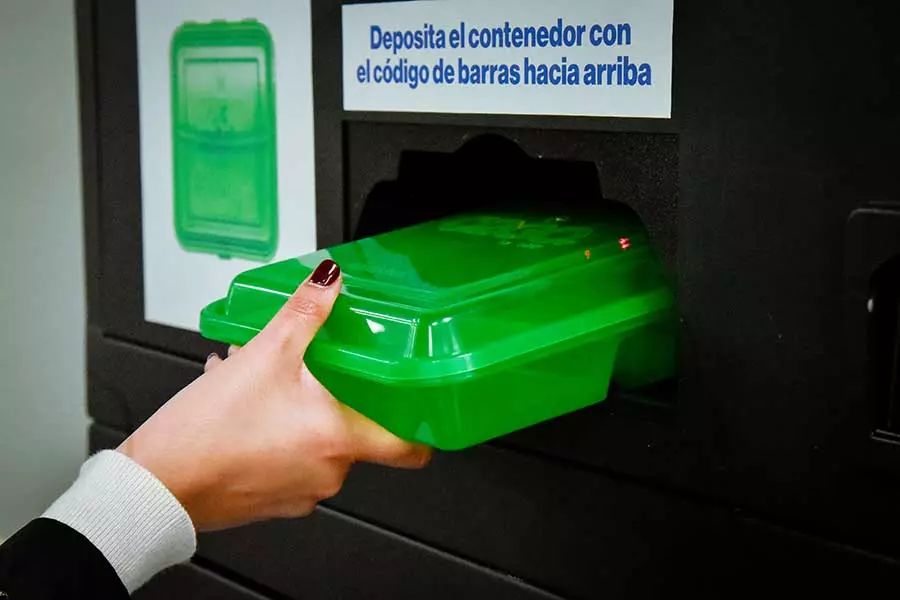
About the QS Sustainability 2025 rankings
The QS Sustainability 2025 rankings identifies which universities around the world are leaders in social and environmental sustainability.
They assess the institution’s capacity to address the planet’s greatest environmental, social, and governancechallenges.
In this third edition, 1,751 institutions from 107 countries were ranked (348 more than last year), of which 409 are from the Americas and 19 from Mexico (7 more than last year).
This year, universities ranked in one or all of the following were eligible: QS World University Rankings, QS Rankings by Region, or QS Rankings by Subject.
Only those universities achieving a minimum number of publications in different areas of the Sustainable Development Goals were evaluated.
YOU’LL DEFINITELY ALSO BE INTERESTED IN:

